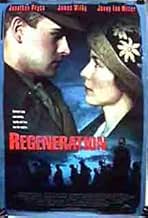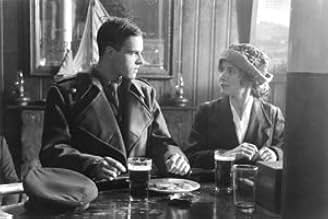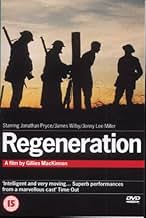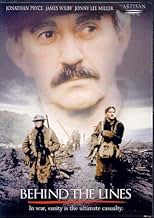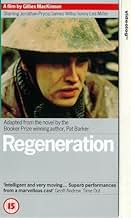Basada en la novela homónima de Pat Barker, "Regeneración" cuenta la historia de soldados de la 1° Guerra Mundial enviados a un asilo por problemas emocionales. 2 de esos soldados son los po... Leer todoBasada en la novela homónima de Pat Barker, "Regeneración" cuenta la historia de soldados de la 1° Guerra Mundial enviados a un asilo por problemas emocionales. 2 de esos soldados son los poetas ingleses más importantes de la dicha guerraBasada en la novela homónima de Pat Barker, "Regeneración" cuenta la historia de soldados de la 1° Guerra Mundial enviados a un asilo por problemas emocionales. 2 de esos soldados son los poetas ingleses más importantes de la dicha guerra
- Dirección
- Guión
- Reparto principal
- Nominado a 1 premio BAFTA
- 17 nominaciones en total
Reseñas destacadas
The drama is based on real events, and the performances are quite stunning. Above all, Jonathan Pryce as Dr. Rivers is simply incredible, a man torn between duty and compassion, a doctor on the verge of becoming a patient himself. In a just world, he would have won an Oscar (but hardly anyone, it seems, saw this film on initial release). The handsome James Wilby gives a very fine performance as Sassoon--in fact, I've never seen him in better form. Johnny Lee Miller perfectly embodies the edgy anger, angst, and shame of Billy Prior. And Stuart Bunce brings a remarkably gentle, otherworldly quality to his haunting portrayal of Wilfred Owen. You absolutely believe that this man has a poet's soul; but he finds his voice not by contemplating beauty but by contemplating supreme horror.
There are many scenes from this film I will never forget--particularly, Dr. Rivers' trip to see another doctor cure a patient of being mute by applying electricity directly to his teeth and larynx. This scene is horrifying and, yet, like the rest of the film, restrained, in part because of the way Pryce portrays Rivers' reactions. Another unforgettable scene is the abrupt, shattering ending--but I won't give that away. Suffice it to say that words, especially the words of a great poet, sometimes are more powerful than shocking images.
This is a very intelligent, moving, humane, and important film. What a shame that it has been so overlooked.
The opening aerial shot of the bloody consequences of battle are every bit the emotional and visceral equal of Spielberg's lauded 20-minute opening sequence in Saving Private Ryan. The rest of the film - in my opinion - surpasses Ryan as a whole in terms of its drama, poetry, anguish and thought.
The performances are outstanding. Jonathan Pryce's portrayal of Rivers falling apart at the seams as he adopts the neuroses and trauma of his patients is astonishing. Johnny Lee Miller is also excellent as the (initially) mute soldier, haunted by the brutality of a trench-attack. James Wilby's Siegfried Sassoon is perhaps the toughest role to play in the film and yet he surpasses any prior (or subsequent) performances with a characterisation that swings from harsh to likeable, strong to weak, right to wrong.
All of the numerous storylines are well constructed and followed to their natural conclusion. There are no false avenues; no bum notes; no waste.
The source material is beautifully adapted for the film (by the rare breed of writer-producer, Allan Scott), losing none of its pace or characterisation. The emotional weight so prominent in Barker's novel are perfectly transferred into the movie. How wonderful for a modern film to have non-stereotypical, imperfect lead characters and lack easy conclusions. How beautifully evoked is the friendship between Sassoon and Owen. There is no sacharine sentiment in this movie; nor artificial shock to induce pity; nor a wasted scene or moment of dialogue. Equally, the period look of the film is stunning. Filmed in Scotland, the vistas are beautifully bleak and wintry. The atmosphere of the First World War is all too frighteningly real.
The music, whilst beautiful, is perfectly restrained. Harking back to the films of the seventies, long moments of silence pervade Regeneration. How did things go so badly wrong in the last twenty years in this respect?
Regeneration achieves the very rare distinction of matching (if not surpassing) the beautiful and moving novel on which it is based. Thoughtful film-goers should treat themselves to this wonderful and intelligent film.
"Regeneration" is different. It is not with graphically real blood spilled, but rather with powerfully wrenching emotion and with poetry that this film drives home what war does to the men (and women) caught up in its sweep. The film's use of the poems of Siegfried Sassoon and Wilfred Owen is stunning, and while perhaps even more of their incredible poetry could have been employed in the film, the ones the filmmaker employs are carefully and perfectly chosen.
This is a war movie because its focus is on the war's destruction of men. But do not go into this film expecting the action of the battlefield to play out on the screen. There are a few scenes from the fields of France, powerful and well-placed in the film. And throughout the movie, you can just hear the dull thudding of shells, as if from a great distance - a striking reminder of how physical distance does not mean emotional distance. But if you are interested in the emotional impact those shells had, in an examination of the struggle to recover from that impact, (through poetry, through love, and through therapy), and in the moral questions raised by war, this is a stunning, deeply moving film you will not soon forget.
Taking a rather different approach from the 'war-is-hell' mass-entertainment spectacle of Spielberg's recent 'Saving Private Ryan' and Terence Malick's elliptical 'The Thin Red Line' (both made in 1998), 'Regeneration' evades easy solutions and focuses on the psychological horrors of war in a more low-key and balanced manner. The horrific battle scenes are largely eluded to in flashback, invoked during the well-meaning Pryce's therapy sessions, which utilise the entire arsenal of early Freudian psychotherapy, from dream-analysis to hypnotism as well as more quirky techniques such as putting shell-shocked officers in charge of troops of boy scouts in order to help them regain confidence in their leadership abilities. The central perplexity here is that the soldiers are being cured with the intention of sending them straight back to the front line.
With this and his following film, 'Hideous Kinky', Gillies MacKinnon is emerging as one of the most thought-provoking and technically accomplished British directors working at the moment, adopting an expressionistic cinematic style here which utilises the dark forbidding milieu of the hospital and the surrounding bleak, autumnal countryside to full claustrophobic effect. There are problems here, in the way that the script concentrates on a number of patients, including an angst-ridden Jonny Lee Miller (in his first post-Trainspotting role) who begins the film mute, without fully exploring the relationships between them, but it successfully establishes itself within a convincing historical context whilst challenging the proposition that Britain was united in its conviction to the First World War (of particular relevance today, given our involvement in the bombings of Kosovo and Iraq). Whilst not immediately accessible, it is a film that demands and rewards the closest of attention, and bodes well for future films from the director. Based on the 'Regeneration' trilogy of novels by Pat Barker.
The opening scenes are done quite like a painting. They are very impressive, and the overhead shots are simply majestic. The story, however, is set in a mental institution, where Doctor Rivers (played with brilliance by Jonathan Pryce) is set on 'curing' the shell-shocked patients. There are three that the movie focuses on in particular: Siegfried Sassoon, Wilfred Owen, and Billy Prior, respectively played by James Wilby, Stuart Bunce, and Johnny Lee Miller.
Previous comments have compared this film to Saving Private Ryan, yet there are several marked differences between the two. Ignoring the fact that they are set in two different wars, Saving Private Ryan examines the idea of heroism on the field, while Regeneration takes look on how war effects men psychologically.
Certainly a worthy look, and a fine addition to any film collection.
¿Sabías que...?
- CuriosidadesThe film used a lot of present and former Territorial Army soldiers as extras for larger scenes. This includes soldiers from 52nd Lowland, 6th Battalion Royal Regiment of Scotland, located in Hotspur street, Glasgow.
- PifiasThe camera and the crane on which it is suspended are reflected in several puddles during the very opening shot (of the battlefield).
- Citas
Capt. William Rivers: I find it interesting that you don't stutter.
Billy Prior: I find it even more interesting that you do.
- Versiones alternativasReleased in the USA in a 96 minute version under the title "Behind the Lines".
- ConexionesFeatured in The 100 Greatest War Films (2005)
- Banda sonoraJust Before The Battle, Mother
Words and Music by George Frederick Root (As G.F. Root)
Performed by Craig Titus
Selecciones populares
- How long is Regeneration?Con tecnología de Alexa
Detalles
- Fecha de lanzamiento
- Países de origen
- Idioma
- Títulos en diferentes países
- Krigets dårar
- Localizaciones del rodaje
- Overtoun House, Dumbarton, West Dunbartonshire, Escocia, Reino Unido(Craiglockhart Hospital)
- Empresas productoras
- Ver más compañías en los créditos en IMDbPro
Taquilla
- Recaudación en Estados Unidos y Canadá
- 33.131 US$
- Fin de semana de estreno en EE. UU. y Canadá
- 19.593 US$
- 16 ago 1998
- Recaudación en todo el mundo
- 33.131 US$


